Charles William Ferdinand, Duke of Brunswick
He joined the allied north-German forces of the Hanoverian Army of Observation, whose task was to protect Hanover (in personal union with the Kingdom of Great Britain) and the surrounding states from invasion by the French.[note 1][7] However George III was less welcoming, and sought to express his displeasure through numerous small insults e.g. by lodging the prince at Somerset House, instead of one of the royal palaces; not providing him with a military guard; and instructing the servants at the wedding to wear old clothes.[7] This merely served to exacerbate the enthusiasm of the public, particularly when the prince was suspected of turning his back on the unpopular monarch while attending an opera (a breach of social protocol).[3] When the American Revolutionary War broke out in 1775, Charles William Ferdinand saw an opportunity to replenish the state's treasury by renting its well-trained army to Great Britain.Under the terms of this treaty, Brunswick-Wolfenbüttel supplied 4,000 troops for service with the British armies in America, under the command of general Friedrich Adolf Riedesel.[3] The duke's combination of interest in the well-being of his subjects and habitual caution led to a policy of gradual reforms, a successful middle way between the conservatism of some contemporary monarchs and the over-enthusiastic wholesale changes pursued by others.[12] He resembled his uncle Frederick the Great in many ways, but he lacked the resolution of the king, and in civil as in military affairs was prone to excessive caution.[3] He brought Brunswick into close alliance with the king of Prussia, for whom he had fought in the Seven Years' War; he was a Prussian field marshal, and was at pains to make the regiment of which he was colonel a model one.The Swedish princess and diarist Hedwig Elizabeth Charlotte visited Brunswick in 1799; she described the Duke as "witty, literal and a pleasant acquaintance but ceremonial beyond description.Frederick William II of Prussia appointed him as commander of a 20,000-strong Prussian force which was to invade the United Provinces of the Netherlands (The Dutch Republic).Much of the country was in open revolt against William, whose personal troops were unable to quell the Patriot militias and the various Dutch provinces refused to aid him.The Encyclopædia Britannica described the Duke's invasion: "His success was rapid, complete and almost bloodless, and in the eyes of contemporaries the campaign appeared as an example of perfect generalship".Both contemporaries and historians have praised the Duke's decisive campaign, in which he manoeuvred to concentrate his forces and achieve overwhelming local superiority, before moving on to the next city.[3][17] He also received credit for the low number of casualties; one British observer suggested that "the sap of the trees was the only blood shed" (an exaggeration),[18] referring to the wooden palisades and batteries constructed by both sides.His avowed aim was: to put an end to the anarchy in the interior of France, to check the attacks upon the throne and the altar, to reestablish the legal power, to restore to the king the security and the liberty of which he is now deprived and to place him in a position to exercise once more the legitimate authority which belongs to him.Additionally, the manifesto threatened the French population with instant punishment should they resist the Imperial and Prussian armies, or the reinstatement of the monarchy.[citation needed] It has been asserted that the manifesto was in fact issued against the advice of Brunswick himself; the duke, a model sovereign in his own principality, sympathized with the constitutional side of the French Revolution, while as a soldier he had no confidence in the success of the enterprise.[citation needed] In Paris, Louis XVI was generally believed to be in correspondence with the Austrians and Prussians already, and the republicans became more vocal in the early summer of 1792.Rather than assuring the continued existence of the French monarchy, Brunswick's proclamation would instead ensure its downfall; the manifesto was rapidly distributed in Paris on 28 July, apparently by monarchists, who badly misjudged the effect it would have.When news spread of a combined Austrian and Prussian army led by Brunswick marching into French soil on the days after the Manifesto was publicized, the Paris populace, already incensed by the threat against the city, exploded into violence.When he counterattacked the Revolutionary French who had invaded Germany, in 1793, he recaptured Mainz after a long siege, but resigned in 1794 in protest at interference by Frederick William II of Prussia.The structure of the high command has been particularly criticised by historians, with multiple officers developing differing plans and then disagreeing on which should be followed, leading to disorganisation and indecision.During the battle he was struck by a musket ball and lost both of his eyes; his second-in-command Friedrich Wilhelm Carl von Schmettau was also mortally wounded, causing a breakdown in the Prussian command.Their eldest son, Karl Georg August (1766–1806) was named heir apparent, but had a significant learning disability and was regarded as "well-nigh imbecile.[citation needed] The future Queen of Sweden, Hedwig Elizabeth Charlotte of Holstein-Gottorp, described the ducal family thus: The Duchess is the sister to the King of England and a typical Englishwoman.The (eldest) prince, chubby and fat, almost blind, strange and odd - if not to say an imbecile - attempts to imitate his father but only makes himself artificial and unpleasant.


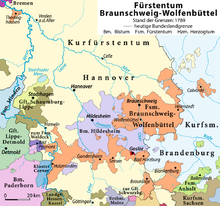

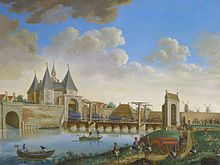
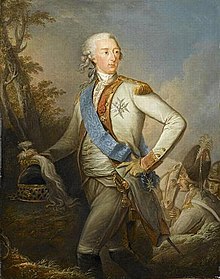
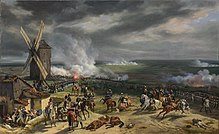


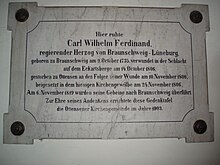

Johann Georg ZiesenisPrince of Brunswick-WolfenbüttelCharles IFrederick WilliamWolfenbüttelBrunswick-WolfenbüttelHoly Roman EmpireOttensenHamburgBrunswick CathedralPrincess Augusta of Great BritainAugusta, Duchess Frederick of WürttembergKarl Georg August, Hereditary Prince of Brunswick-WolfenbüttelCaroline, Queen of the United KingdomFrederick William, Duke of Brunswick-WolfenbüttelBrunswick-BevernCharles I, Duke of Brunswick-WolfenbüttelPrincess Philippine Charlotte of PrussiaGermanduke of Brunswick-Lüneburgprincely statesbenevolent despotFrederick the GreatPrincess AugustaGeorge III of Great Britainfield marshalPrussian ArmyNapoleonic WarsBattle of Jena–AuerstedtSchloss WolfenbüttelWolfenbüttel CastlePhilippine CharlotteFürstimperial statesFrederick William I of PrussiaFrederick II of Prussiaheir apparentsovereign princeHereditary PrinceErbprinzBrunswickBrunswick PalaceSeven Years' WarHanoverian Army of ObservationHanoverpersonal unionKingdom of Great BritainPrince William, Duke of CumberlandBattle of HastenbeckInvasion of HanoverConvention of KlosterzevenFerdinand of Brunswickgeneral officerBattle of MindenBattle of Warburgirregular warfareDuchy of Brunswick-LüneburgSalic lawElectorate of Brunswick-Lüneburg (Hanover)Hanoverian branch of the familyFrederick, Prince of WalesPrincess Augusta of Saxe-GothaKing George IIILondonHarwichParliament of Great BritainSomerset HouseWilliam Pitt the Elderprime ministerparliamentary oppositionPompeo BatoniMarmontelVoltaireJohann WinckelmannPietro NardiniNaplesPrincipality of Brunswick-WolfenbüttelexclavesThedinghausenCalvördeElectorate of HanoverGreat BritainElectorate of BrandenburgPrussiaBishopric of HildesheimGeheimratAmerican Revolutionary Warservice with the British armies in AmericaFriedrich Adolf RiedeselGerman troopsSaratoga campaignJohn BurgoyneBattles of SaratogaConvention ArmyContinental Congressenlightened despotconservatismenlightenmentCarl Friedrich GaussKarl August, Duke of Saxe-Weimar and Saxe-EisenachGoetheHabsburg monarchyAustrian NetherlandsElectorate of BavariaFürstenbundJoseph IIHedwig Elizabeth CharlotteGerman Mediatisationimperial abbeysGandersheimHelmstedtsecularisedWar of the Bavarian SuccessionFrederick IIPatriottentijdPrussian invasion of HollandGeneralfeldmarschallFrederick William II of PrussiaUnited Provinces of the NetherlandsPatriotsBatavian RevolutionstadtholderWilliam VHouse of OrangeEncyclopædia Britannicathe Duke's invasion